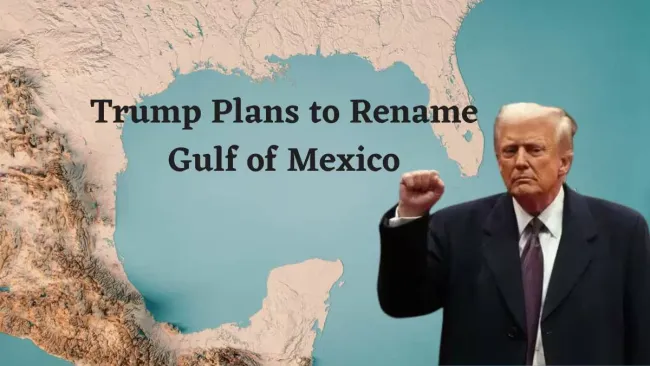Why Trump Wants to Rename the Gulf of Mexico and Denali: The Bold Vision of a New American Empire
Donald Trump, the twice-elected president known for his "America First" mantra and obsession with border walls, has unveiled a startling new vision: expansionism. From proposing to buy Greenland and annex Canada to renaming the Gulf of Mexico the "Gulf of America" and reclaiming Alaska’s Denali, Trump isn’t just promising to make America great again—he’s envisioning a bigger America. This isn’t just rhetoric; it’s a bold embrace of a new American imperialism, cloaked in patriotism and sold as destiny.
From Walls to Frontiers: Trump’s Expansionist Vision
Trump’s recent speeches, steeped in nostalgia for the "frontier spirit," mark a dramatic pivot. The man once fixated on closing borders now dreams of opening them—not to people, but to territories.
- Renaming the Gulf of Mexico: Calling it the "Gulf of America" isn’t just a rebranding stunt—it’s a power play. Trump’s message is clear: this is ours. For him, it’s not enough to dominate; he seeks to claim and rename.
- Reclaiming Denali: His push to restore Denali’s pre-Obama designation is less about heritage and more about rewriting history. Trump’s stance? “We decide what this land is called and what it represents.”
Manifest Destiny 2.0: Trump’s Imperial Dream
Trump’s rhetoric revives the 19th-century concept of Manifest Destiny—the belief that America was destined to expand across the continent. But Trump’s ambitions extend beyond borders to the north, south, and even into space.
- Channeling the Founding Fathers: Trump echoes the strategies of Thomas Jefferson and James Madison, who saw expansion as vital to America’s survival. Jefferson’s Louisiana Purchase wasn’t just about acquiring land—it was about consolidating power. Trump grasps this, positioning his expansionist ideas as essential for America’s future.
- Glorifying Conquest: America’s historic expansion came at the expense of Native Americans and Mexicans. Trump doesn’t shy away from this legacy—he amplifies it. His vision of a larger America is steeped in the glorification of conquest.
20th-Century Playbook: From Land to Global Dominance
With no land left to conquer, 20th-century America shifted to dominating markets, ideas, and militaries. Trump’s vision updates this strategy, aiming for total supremacy.
- Economic and Technological Power: Trump’s expansionism isn’t limited to physical borders; it encompasses economic and technological dominance. The American Dream becomes the frontier—endless growth and opportunity.
- Global Influence: America didn’t stop expanding; it broadened its reach through wars, diplomacy, and cultural exports. Trump seeks to double down on this legacy, with his signature bravado.
Trump’s 21st-Century Empire: Bold and Brash
Trump’s imperial vision is as ambitious as it is audacious.
- Territorial Goals: Buying Greenland? Annexing Canada? Retaking the Panama Canal? These aren’t just wild fantasies—they’re statements of intent. Trump is sending a message: “We’re not done growing.”
- Space: The Final Frontier: Trump’s declaration to "pursue our Manifest Destiny into the stars" isn’t just about Mars; it’s about staking claims in space. For Trump, space isn’t just the final frontier—it’s the next empire.
The Strategy Behind the Spectacle
Trump’s expansionist rhetoric isn’t just about ambition—it’s a calculated power move.
- Galvanizing His Base: By evoking the frontier spirit, Trump reenergizes his supporters. MAGA enthusiasts aren’t just waving flags; they’re envisioning a United States that spans continents and beyond.
- Shifting the Narrative: After a divisive first term, Trump’s vision offers a unifying message of ambition. It’s not just about greatness—it’s about bigness, boldness, and dominance.
The Pushback: Criticism and Controversy
Not everyone is on board with Trump’s imperial dreams.
- Historical Contradictions: Critics point out the irony of Trump, the isolationist, suddenly embracing expansionism. They argue his proposals are more about distraction than policy—a spectacle to overshadow his shortcomings.
- Diplomatic Tensions: Trump’s ambitions have already ruffled feathers. Denmark dismissed his Greenland proposal as absurd, and Canada isn’t amused by annexation talk. But for Trump, controversy fuels his narrative.
Conclusion: Building the Empire
Trump’s vision of a new American empire—complete with a renamed Gulf of Mexico and a reclaimed Denali—isn’t just political theater; it’s a bold provocation. It underscores a central truth: America’s story has always been one of expansion, conquest, and domination.
Love him or hate him, Trump understands this narrative better than anyone. He’s not just building walls; he’s building an empire. And whether this vision is reality or mere fantasy, one thing is clear: Trump’s America will never be small.
